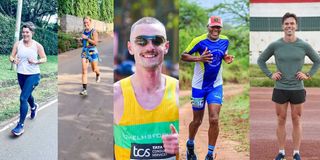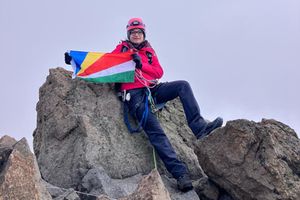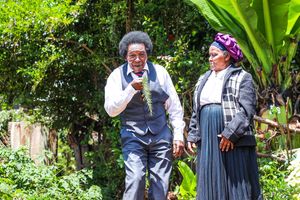
From left: Carla Maria Ariñez, Dominic Kremer, Benjamin Felton, Modise Koofhethile and Dmytro Moyseyev
Some travel to Kenya knowing the specific club or camp they will join, while others get to the country and explore; they are wanderers after all, and exploration is part of what their lives entail. It is not because they can’t run in their countries, it is that every running fanatic’s dream is to set foot where running greatness has been born, nurtured and excelled.
Some share training camps and running trails with the world’s elite runners, and in the process, they learn a thing or two about running and endurance from these exceptional athletes. And even though most do not intend to run competitively, at least as elite athletes, they consider it an honour to run with greats like Eliud Kipchoge.
And they pay a considerable amount of money, anywhere between Sh95,000 to Sh300,000 for about two weeks of stay in Kenya, not inclusive of air tickets and other expenses.
Lifestyle had a chat with some of the runners who often visit and run on Kenyan soil.

Ireland’s Dmytro Moyseyev, an ultra-marathon runner, during training at Kipchoge Keino Stadium in Eldoret City, Uasin Gishu County on November 05, 2024.
Dmytro Moyseyev, a lawyer from Ireland
Dmytro Moyseyev, 29, from Ireland, is a recreational runner with a verve for long-distance running. Professionally, he is a lawyer of enviable acumen; on the course, he is a pusher of limits.
For context about limit-pushing and going beyond, Dmytro has covered the length of his entire country, a 570-kilometre stretch in 138 hours of nonstop running, save for designated stops for food and water, bathroom breaks and shoe changes. Dmytro also did a 50 marathons in 50 days challenge in 2024. So, what attracts a man with such an enviable running spirit to Kenya?
“I have been running for the last six or so years. At first, I did short distances, which eventually pushed the needle to ultramarathons,” he told Lifestyle. These uncharted waters, Dmytro says, led him to desire to visit and train in Kenya to learn about the Kenyan running “DNA”. “It was not a hard choice to make, first, because a marathon friend had been in Kenya and they talked highly of the training facilities as well as the perfect atmosphere to train. Secondly, Kenya is known for long-distance running, and legends (not just Kenyans) have conquered the world by training on Kenyan soil.
Each day, you come across Olympic champions and observe how they do it, their discipline, training commitment and mentality towards the sport. These are invaluable ‘trade secrets’ that are hard to come by anywhere else,” he says.
Dmytro doesn’t just run on Kenyan soil, he creates content about his running experience in Kenya. He records his trainings and posts them on his social media accounts, something he says might encourage runners from other parts of the world to try out Kenya.
He is a common face in Kenya and in the streets of Iten and Eldoret, where he favours training. He has made friends on the trail with greats like Eliud Kipchoge, who, according to a post shared on Dmytro's socials, gave him tips on how to run a 2:00 in Boston.
When Lifestyle met him the first time, Dmytro was in Kenya for eight weeks to train for the upcoming Boston Marathon.
“When preparing for long runs, like major marathons, I come to Iten to ready myself. The high altitude here is good for endurance building. I have made friends and created networks here. Unlike the first time I visited, it is easier to get into the country and have my eight weeks of training since I have known my way around and I am familiar with the place and its processes,” he says.
He is a regular at the Kipchoge Keino Stadium in Eldoret City, Uasin Gishu County and the historic Kamariny Stadium in Elgeyo Marakwet County. At the 129th Boston Marathon, he finished the 26 miles in 2:43:18.
“I had several personal bests across many distances and got to run a sub 2:45, which was the goal I sought to attain when I travelled to Kenya weeks earlier to train for Boston. The hills in Iten prepped me well for Boston. The notorious Heartbreak Hill was easy for me. I realised that I had finished the hill at kilometer 35,” he said.

Modise Koofhethile, the 57 year old recreational ultra marathoner from Botswana in April 2025, in Nairobi Kenya.
Modise Koofhethile, logistics expert from Botswana
At 57, Modise Koofhethile is a man on a mission; to run as much as he can for as long as he can. The Botswana national is a recreational ultra-marathoner with a knack for experiencing new running destinations.
“I have run in five continents so far, and my target is to do the last two soon,” he says.
Every day, he pushes himself to hit the road regardless of how he feels. When Lifestyle caught up with him in April, running with a local club, Modise was experiencing some pain in his knee.
“Sometimes you just have to push beyond the pain. The body listens to the mind,” he said.
He first visited Kenya 12 years ago, then just a social runner doing five or 10 kilometers as often as he could.
“Botswana is a flat and a very hot country, we are talking of temperatures of 40 degrees Celsius at times. Running in Kenya is therefore something I am always looking forward to,” he says.
Modise grabs every opportunity he can to run while he is in Kenya. “Since my wife moved here for work, I make regular visits, and while I am here, I will run alone, I will run with friends, new clubs, people I haven't run with, anything that can keep me running,” he says.
He is what you would call the urban runner, unlike Dmytro, he has not been to any camp or run among elite athletes, his recreational running while in Kenya has largely been done in Nairobi.
“I am part of several running groups and fitness communities in Nairobi. The good thing about running is that you get to network as well. Through this networking, I have met other people with similar and greater passions. So, you will see me in many WhatsApp groups and online and offline spaces. Running is universal and does not pay homage to boundaries and the structures of separation like nationality and race. I gel in quite effortlessly. It helps that I am in the country every once in a while,” he says.
Modise is an ultramarathoner as well. When running one, he will push up to 89 kilometers a day.
“It is all in a day’s work, or we are being more objective—all in a day’s run,” he says.
He has run up the Ngong Hills, done the Lukenya Challenge, and he is a regular at the "We Run Nairobi" weekly runs—which on any given weekend will offer him an opportunity to cover about 30km and above. His attachment to Kenya is no longer about family alone.
“Today, even if my family moves from Nairobi, I have made enough networks that I am sure will have me coming back regularly to cover more kilometres,” he says.
His challenge, however, is constrained pedestrian spaces on road shoulders.
“Things have improved over the last few years, we are seeing more and more dedicated spaces on the roads for pedestrians. But some of the spaces are too small to support running and other pedestrian activities as well.”

Carla Maria Ariñez the 37 year old environmental and social specialist running in Spring Valley, Nairobi in March 2025.
Carla Maria Ariñez, a development expert from Bolivia
Carla Maria Ariñez, 37, is always on the run, not in literal terms, rather, always looking for the next thrill. The Bolivian national runs in every Kenyan town she visits.
“I am what you'd call a citizen of everywhere and nowhere. A nomad, you can say. Every country I visit, I run. It is the first thing I do when I get into a new country. I try connecting to a running community because somehow, running centres you, not just physically, but culturally as well. You observe a lot, you learn a lot while running with other people,” she offers.
She started running about two years ago.
“Theoretically, I had been told I would never run. I had this knee problem that doctors said wouldn't allow me to subject my body to strenuous activities,” she says.
She sought alternative opinions, and when she was given a go ahead, she started running. At first, shorter distances and gradually increased with time.
Her first running activity in Kenya would have been the 2024 edition of the Nairobi City Marathon. “I had just applied for a job in Nairobi, and well, I registered for the marathon. Unfortunately, it didn't materialise as it was postponed due to the protests that happened around the same time.”
Six months ago, she plugged into a local running club. Like Modise, she is keen on gelling with local running communities whenever she visits a country. She's run South Africa's Oceans Marathon, the K.K Lusaka Marathon, and the Victoria Falls Marathon.
In Kenya, she has run in Nairobi and Lamu.
“Kenya is a soft landing for many running enthusiasts, I'd say. First, with the vibrant running culture then the favourable climate, I'd call it a runner's paradise. It presents the runner with the best opportunity to work out their running goals and hit those personal bests,” he says.
At first, Carla was sceptical about running, especially in the streets.
“There is a way women are disproportionately disadvantaged in terms of security on the streets. Add that to me being a foreign woman, and the matrix gets even more complicated. That is why it is important to run with people you are familiar with, in this case, a club. My first runs were principally about mapping out and getting to understand my environment. Awareness helps you avoid trouble. Once I did that, I felt comfortable running, and I easily gained the confidence to run alone, even though I still run more in the club setup than I do alone. Three of the four weekly runs I do while in Kenya are within the club's ecosystem,” she says.
Her biggest challenge, she says, is the constrained running spaces on Kenyan roads. “The roads are narrow, and that means reduced pedestrian walkways. At times, these spaces are also shared with motorbikes and matatus, which makes it difficult for runners to safely and comfortably run.”
Undeterred, she will take every opportunity she can to run in Nairobi.

Felton at the 2025 London Marathon.
Benjamin Felton, sports influencer, from United Kingdom
In 2023, Benjamin sought the services of a company that organises sports tourism and camps in Kenya.
“I got influenced by friends who’d seen me running since 2023. Since I hadn’t been to Kenya, it made sense to visit under an organised tour,” he says.
He went straight to Iten, where he camped for two weeks.
“The two weeks allocated to us were not enough to prepare for the marathon I wanted to run, so the plan to visit again for a longer period was hatched then.”
He has been to Kenya four times.
"All of them I have camped in Elgeyo Marakwet, where I stay for three to four weeks. He has figured his way around Iten, and you will see him at local eating joints, having a meal with local runners, visiting the local market and recording videos of his experiences in Kenya."
He compartmentalises his visit into two parts.
“My body will take the first seven to 10 days to acclimatise to the weather and the new environment before I get to the serious part of my visit.”
For a recreational runner, Benjamin has quite a record to show.
“I have run a 2:24 full marathon. This is somewhere up in the ranks among elite professionals. Part of this has been achieved because I have trained in Iten and the larger North Rift region of the country. The weather here is great even when it's cold. I feel at home here. Kenya, being an English-speaking country, navigating around is easy. I have now been here four times, and I plan to visit Kenya more times as long as I keep running,” he says.
At the time of doing the first part of the interview, Benjamin was in the country to train for the London Marathon, which was his seventh.
“I crossed the line in 2:35, not what I had hoped for, but I enjoyed my time in London,” he says.
Later in the year, he will be back in Kenya to train for the Valencia Marathon before closing the year on long-distance running.

Dominic Kremer the 29 year old Graphics Designer, running in Kileleshwa, Nairobi in January 2025.
Dominic Kremer, graphic designer from the Netherlands
Dominic Kremer, 29, fell in love with Kenya when she first visited in 2019. For as long as she can remember, she has always been active.
“I have photos of my nine-year-old self running. And so it goes way back,” she says.
A 2018 accident changed the way she looked at running and working out in general.
“Running is a healing process,” she says.
Like Carla, who is a suave urban runner, she takes on the roads like she was born to do it. Every week when in Nairobi, you will see her at least four times pushing her body and striving to attain personal bests.
Originally from the Netherlands, Kenya offers her good weather that she can take advantage of throughout the year.
“High altitude running enhances aerobic capacity, oxygen utilisation efficiency and improves endurance. Nairobi is on a higher altitude than most, if not all, of my home country. My body has acclimatised to running here. Back home, I wouldn't have any trouble in endurance running, like say, a half marathon.”
Running in Nairobi for her goes beyond physical fitness, “It is the peace of mind that comes with it. I get time to spend with myself and my thoughts. It also gives me some time for creativity. As a graphics designer, quiet moments are key in building excellence. This I get while running, I find that after every run, I can think better, create better, and generally relate better to my work. Beyond this, it also offers me an opportunity to network. As a foreigner, it is easy to feel alone in a country where you barely know anyone. Having infused myself into a local running club, I am always meeting people regularly, exchanging ideas and creating valuable networks, and while at it, learn and enjoy the Nairobi Urban Culture.”
Later this year, she will participate in the Rwenzori Marathon, and as such, she has immersed herself in training for the August event.
Dmytro, Modise, Carla, Benjamin and Dominic are only a few of the hundreds of recreational runners that have tasted a piece of the Kenyan running pie baked in Kenya's relatively high altitudes, favourite of every runner.
What’s common with their experiences and narratives is that Kenya is a global treadmill that everyone should try.






